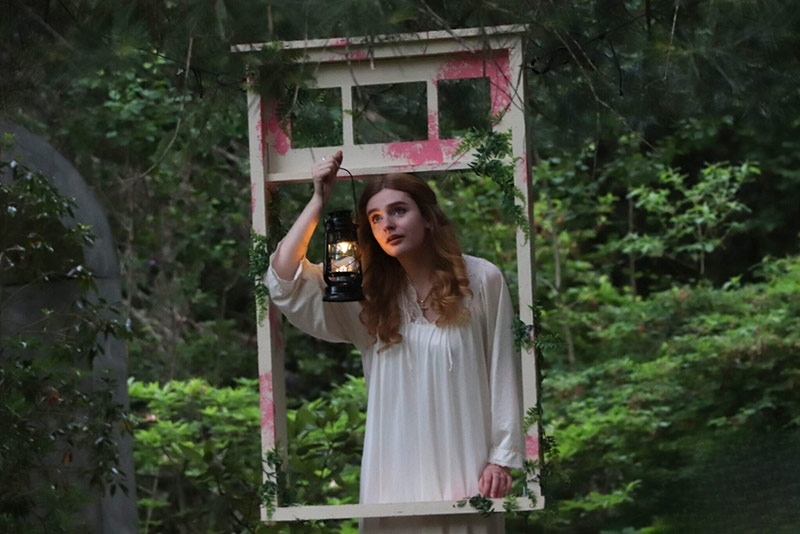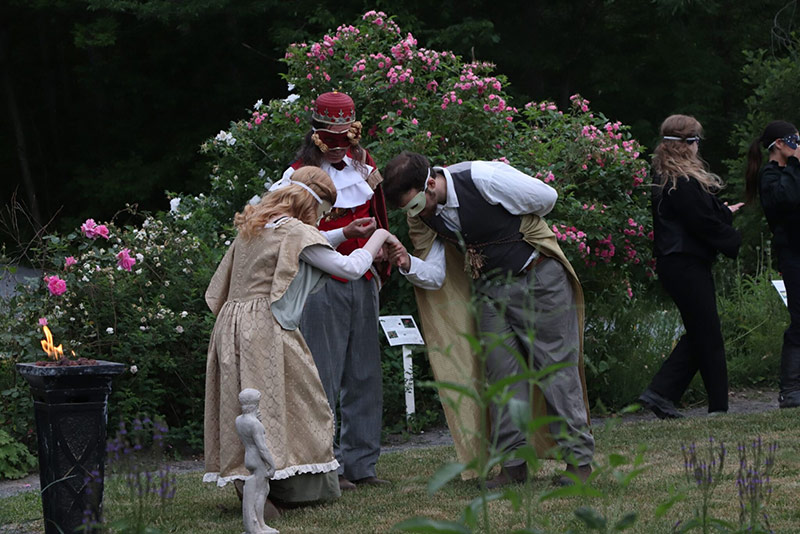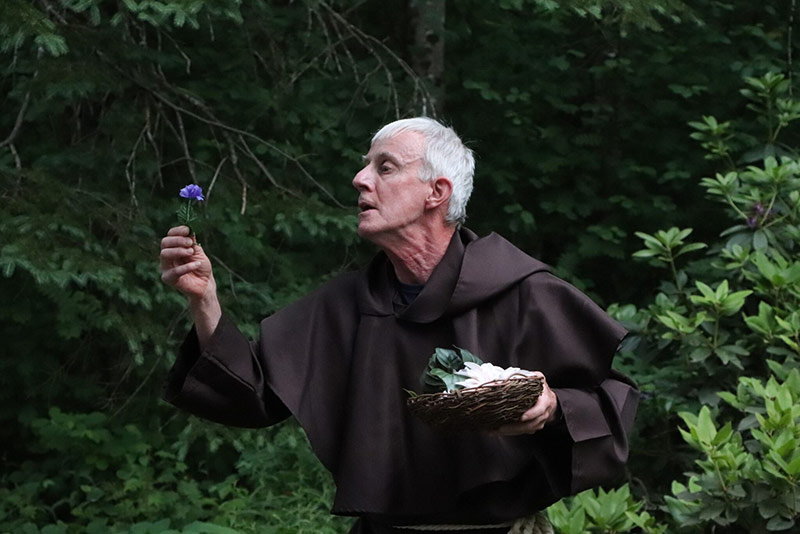A moveable feast: Summer Shakespeare outdoors in Fredericton
Author: Camila Lefebvre
Posted on Jul 4, 2024
Category: UNB Fredericton

In the late afternoon, people gather around a blue sign indicating where the play will start. The action begins when the director opens his arms wide, guiding the audience to the first scene location, the Rock and Crevice Garden in the Fredericton Botanic Garden.
The Shakespeare play, Romeo and Juliet, unfolds with actors entering and exiting the audience's surroundings, gentle plucks of string blowing fabric to the wind and masked faces enigmatic. A darker tone of guitar accompanies slashes of swords glimpsed from kicked dust during the teeth-clenching climax of the tragic tale.
A sense of urgency pricks at the hairs on one’s arms, following scene after scene, for the poisoned drink over laced hands. As the sun sets, the plot brought to life by the crew of Bard in the Barracks grows as shadows on trees.
John Ball, who plays Friar Lawrence in this summer’s Romeo and Juliet production described how the natural environment influences outdoor theatre.
“Birds and frogs are audible in the background throughout Romeo and Juliet. There was a wonderful moment when we did King Lear in 2011, where I was Lear and [called] on the gods and the heavens to curse Goneril with infertility. As I did, thunder crashed,” he said.
Ball is a postcolonial and Canadian literature English professor at the University of New Brunswick (UNB) and a drama enthusiast. He has acted with the Bard in the Barracks company since the first production and is part of the company’s board of directors.
This summer’s night
The company embarked on its summer season with two productions: Romeo and Juliet at the Fredericton Botanic Garden and Twelfth Night at Barracks Square. Both plays are to be performed until July 7.
The tragedy of Romeo and Juliet is an immersive promenade-style play, done outdoors. The audience becomes part of the action, walking to different locations in the park, while the movement of the play surrounds the audience.
The comedy of Twelfth Night is being performed more traditionally, setting-wise, in the location that donned the name of the company, while its casting and costuming challenge traditional theatre conventions with a queer lens that implements cross-gendering and cross-gartering.
Len Falkenstein, the director of the Romeo and Juliet production, created Bard in the Barracks in 2006. He has been the director of drama at UNB since 1999, teaching primarily theatre and playwriting. Bard in the Barracks came to life as a sister company to NotaBle Acts Theatre Company, which produces upcoming plays by New Brunswick playwrights.
Although Bard in the Barracks initially served to financially support NotaBle Acts, “it's become its own thing. It's filled a gap in the community where there isn't another theatre company that does classical theatre, especially large-scale classical productions,” said Falkenstein.
The UNB connections don’t stop with Ball and Falkenstein. Mary Walker plays Juliet in this summer’s Romeo and Juliet production. She studied drama at UNB and has worked with Bard in the Barracks for five years, where she first discovered Shakespeare.
The student body behind the Bard
Student summer jobs in the company are funded by the Alvin J. Shaw endowment and UNB’s Arts Internship Program. Students participate in the crew behind the scenes, doing administrative work, building props, costumes, lighting, sound and publicity.
“It has been a way to support UNB students,” said Ball, “and give them work experience in a [live theatre environment]. Len has done a great job of building up an infrastructure that has intersected positively with the drama program and with students coming through that program.”
Walker became involved with Bard through the Arts Internship Program at UNB.
“I've worked as an actor for the Bard shows,” she said, “but also as a crew member. I have done a fair bit of publicity as well. [It’s been] cool to explore all the different facets of theatre through that.”
Occasionally, the company can also provide a position for students to fulfill their fourth-year drama course requirements.

Natural performances
Falkenstein determines the setting by surveying the local environment and thinking about what scenes might fit in what spots. He focuses on how the different types of natural features and landscapes can enhance a performance.
“We did Julius Caesar a couple of years ago,” he said, “We [stabbed] Caesar on the front steps of the legislature building.”
There are a lot of factors like the movement of the audience and actors between scenes, and how the crew will set up what they need in between scenes.
Walker says the outdoor settings contain years of historic energy that she channels into her acting.
“I love performing in the park. Being in the woods [is] timeless. You get a sense that this location you're performing in [today] feels like it may have looked the same as it [did] for decades or hundreds of years. It has a magical feeling to it.”
Even technical elements are different from an indoor theatre; sound and light move differently.
“If you're delivering lines about the moon in the sky, for instance, there will be a moon right there. I find it [easier] as an actor to conjure up emotions in the woods because it is so atmospheric,” said Walker.
In these dark, mysterious and serene woods, Ball recalls actors creatively making their entrances in the wetness and unevenness of the ground of Falkenstein’s Macbeth production.
“We've had actors do their performances from the branches of trees. You make your entrances not from backstage, but sometimes from 50 meters away,” Ball said.
Atmospheric elements become amplified by the setting. In Macbeth, Ball said bagpipes played during the Birnam Wood scene. “It was a spine-chilling moment.”
Intentional paths
The Bard in the Barracks company aims to provide people in Fredericton and those visiting with professional calibre performances. The crew seeks to deliver large-scale Shakespeare productions in innovative and rigorous ways.
Walker brings a unique interpretation of her characters by thinking about their unexplored interpersonal relationships with other characters.
For Ball, the collaborative nature of theatre is central, and “a unique form of storytelling. It’s wonderful to be part of the story, to be embodying one of these timeless, iconic characters.”

Falkenstein emphasizes that as the community and culture evolved, so did their Shakespeare performances, incorporating queer takes on traditional plays and genderless castings.
“That's certainly something that's been reflected in our practice,” said Falkenstein. “We [continue] trying to find as many opportunities as we can for people from diverse communities to fill roles.”
Moreover, he enjoys the audience’s reactions, and the joy families get from coming to see the Bard’s performances.
“You’re seeing families come out [with their] kids and they're just having the time of their lives going on this little adventure through the woods,” said Falkenstein.
The force of community
Bard in the Barracks has evolved tremendously since its creation in 2006. The company started with one show each year. Now there are two productions a year, with two separate casts and directors. This helps with scheduling rehearsals over a short space of time and gives cast members time to rest in between performances.
Falkenstein expects that as the company grows, it will be able to hire more people and compensate the crew even further for their hard work.
The people behind Bard in the Barracks share a deep appreciation of the arts with their audience, which continues to support and grow their involvement with the productions.
“It's something that I will always keep doing [for] as long as I can, as long as my brain will keep memorizing lines and my body will not mind clambering around in the woods,” said Ball.
